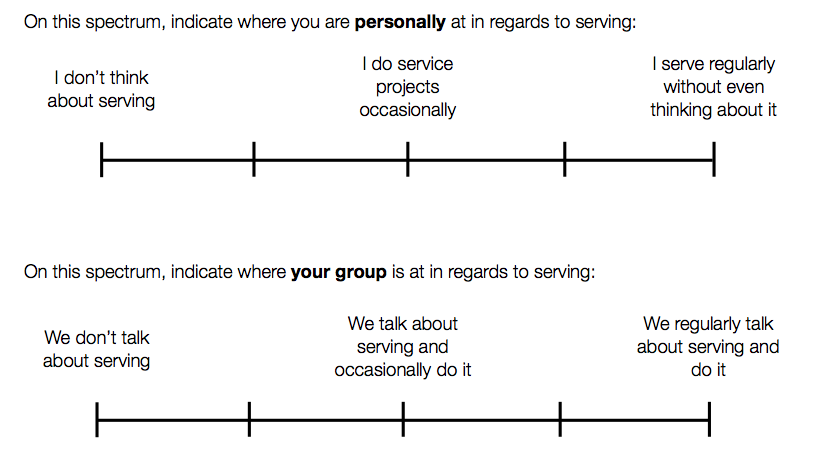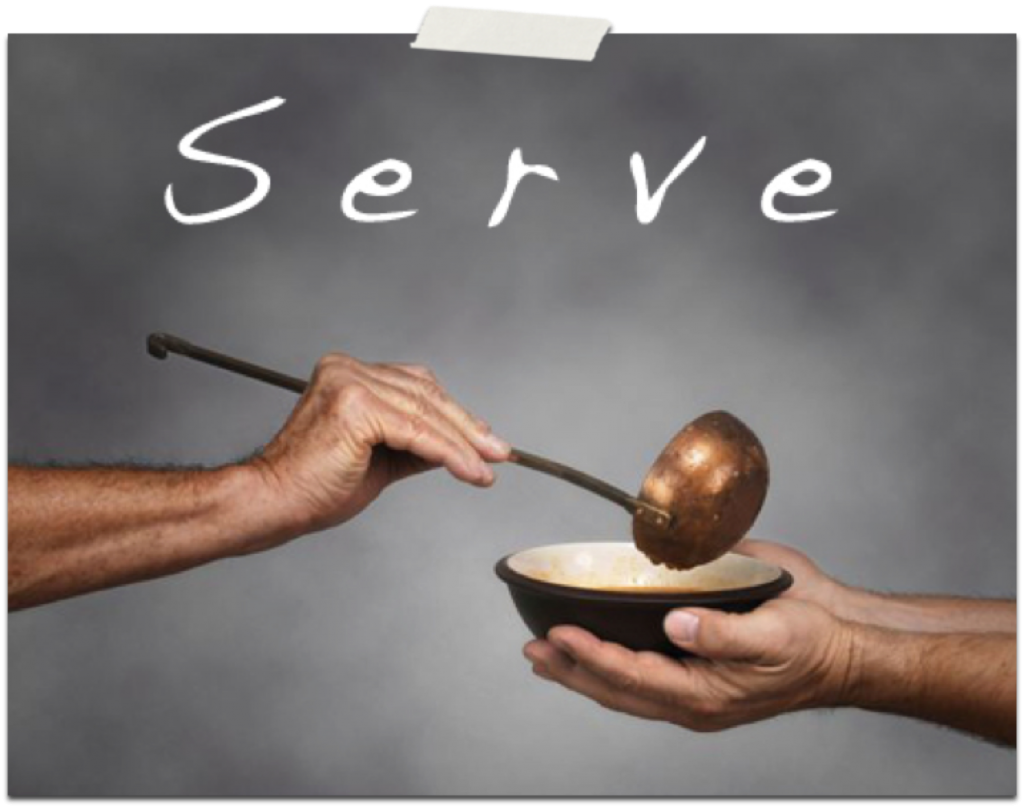Since we all understand “serving” differently, my goal in this article is to re-envision or redefine our understanding of serving. In a way, if our understanding of serving is a box, then instead of thinking outside of the box, I want to grab an eraser and give you a blank canvas.
So take a look at these two spectrums and self-analyze where you’re at personally and where your group is at in regards to serving:

The fact is, our lives are filled with opportunities to serve at every moment–and most of us are serving on a regular basis, without even knowing it.
- i.e. When you choose to do those dishes, that’s an act of service.
- i.e. When you choose to shovel your neighbor’s sidewalk as you do your own, that’s an act of service.
- i.e. When you wave “thank you” while you are driving, rather than giving people another gesture, that’s an act of service.
However, especially in group life, serving has become a task, rather than a regular rhythm of our groups. Serving has become a task because we myopically view serving merely as a project that we do together, in a concerted effort, rather than something that we would do ourselves. It’s unnatural for us.
Now, I’m not saying, “Don’t get together to serve.”
What I am suggesting is that we admit that there are some inherent problems in service projects as we’ve come to know them.
Service projects are great because people in need are being served, but what often happens is that we interpret serving through a consumeristic lens. For example, “I’m the one giving you the goods of service, so you better be thankful, but I have the authority and power over you because I’m the one serving you.” I know that none of us actually say or think this, but this is what is actually happening. After all, what happens when those who we are serving don’t respond with gratitude? Or even better yet, tear us down? It doesn’t make us feel that good anymore, does it? If we were really serving out of a pure heart, and not to tick a check box off, or get a pat on the back, then we ought to be okay with being “persecuted” when we serve. After all, it’s ultimately Christ we are serving, isn’t it?
The fact is, most service projects are one-offs that are task oriented, rather than relationships that are being developed and cultivated.
What would it look like to move away from task dominated serving, to relationship dominated serving?
In my group, we’re trying to figure out what this looks like. What does it look like to incorporate serving one another as a part of the rhythms of our lives, rather than as tasks? Click here to read my post about it.
As we do this, our community is painting a picture of the Kingdom of God. My conviction is that the way we live our lives in community is going to be the most powerful apologetic for Christ in the 21st century. When the world sees the love that we have for one another, the way we serve one another, and care for one another, how can the world not want to be a part of it?
Live such good lives among the pagans that, though they accuse you of doing wrong, they may see your good deeds and glorify God on the day he visits us. – 1 Peter 2:12
Check out these stellar quotes:
- Today, contemporary people are searching for an inclusive community that is democratic, non patriarchal and compassionate. Their preference for a group is that it be raw, not refined; earthy, not sophisticated; concerned with action, not just theory. – Alan Hirsch and Michael Frost, The Shaping of Things to Come
- What postmodern people are crying out for is not better doctrine or clearer theology, but simply kindness in a chaotic and haphazard world. – Alan Hirsch and Michael Frost, The Shaping of Things to Come
- Evangelism is best done out of the context of a gospel community whose corporate life demonstrates the reality of the word that gave her life. – Tim Chester and Steve Timmis, Total Church
- The invisible God is made visible through the love of the people of God. The life of the Christian community is part of the way by which the gospel is communicated. Leslie Newbigin describes the local congregation as “the hermeneutic of the gospel” – the way in which people understand the gospel. – Tim Chester and Steve Timmis, Total Church
So here’s the million dollar question:
“Are you a group with a mission?” or “Are you a group of missionaries?”
On the one hand, a group with a mission comes together for one common purpose, or calling, to serve together and be a blessing together in a concerted effort, over a long period of time. This could be at the local shelter, food bank, or even at a watering hole in your neighbourhood.
On the other hand, a group of missionaries all have their own environments where they’re called to be a blessing to. Thus, when the group comes together, they will share stories and ask one another how they’ve shown the love of God to those they’re called to.
Neither is right nor wrong. The important thing is that you define, as a group, what you’re called to in this season–it may change, but it’s important to define. What’s wrong is not having a focus.

Great article, Daniel. The one thing I would invite you to think through more closely is the way you use the word “Missionary.” I get that you are bringing a bit of poetic flare to “are you on a mission or are you a missionary” but the word “Missionary” is often misunderstood in the modern evangelical context. A missionary is someone serving cross-culturally. As followers of Jesus we are all called to serve. We are all called to the be a part of the mission of God, but we are not all called to be missionaries.
In today’s day and age where the nations have come to the West, I believe that we can all be missionaries and serve cross-culturally right here in our neighborhoods. 🙂
this is very helpful!
Thanks!